Divided We Fall
 Words of wisdom, from time immemorial. Divided we fall. Time heals all wounds. Do unto others as you would have them do unto you. Moderation is the key; the golden rule. Seek fulfillment and happiness within yourself. To some jaded individuals they are but bromides; to the good souls who walk among us they are the key to a successful life, a balm to troubled souls. For who can doubt we are indeed our brothers', our sisters' keepers?
Words of wisdom, from time immemorial. Divided we fall. Time heals all wounds. Do unto others as you would have them do unto you. Moderation is the key; the golden rule. Seek fulfillment and happiness within yourself. To some jaded individuals they are but bromides; to the good souls who walk among us they are the key to a successful life, a balm to troubled souls. For who can doubt we are indeed our brothers', our sisters' keepers?
The "Divided We Fall" which I'm referencing in this piece is a film, a Czechoslovakian film, a period piece which takes place during the Second World War, 1939 to 1945. This is a film with a bold purpose, filtered through the perception of an embattled population whose homeland has been invaded by the most merciless army of murderers in modern history, yet bathed in the warmth of humanity which seeks to do its best - on occasion. The screenplay for this film is a truly original one, augmented with fine acting, excellent cinematography, and a musical score which does much to enhance enjoyment of the amusing segments as well as those fraught with misery.
The topic of the film is that of an evil occupation, with the Holocaust as background. Yet there is much humour relevant to the human condition and survival injected into the story, and this is as it should be. Reality is grim enough and that particular reality so grim as to be unbelievable in that we face true difficulties understanding the extent of man's inhumanity to man.
This is one of those rare films which, having been viewed, you comprehend that you have not wasted your time. Its value as a statement of the human condition with all its foibles; humans demonstrating their potential to be good, to be evil, to be excessively ugly, looking the other way when a collective refusal to accede to the horrors of genocide might conceivably effectively derail its progress. As the tiny, courageous nation of Denmark demonstrated, to its eternal honour as a nation of heros. This film is as removed from the triteness, the insecurity and issue-triviliazing of a Hollywood-produced film as is ever possible to imagine.
A village in Czechoslovakia is captured in the net of Nazi German, its citizens wrapped in an all-encompassing web of fear. As everywhere else within Nazi Germany's spheres of occupation the most obvious and endangered targets are the Jewish population and it is to them that the final solution of race-obliteration is aimed with deadly accuracy and force. Those others in the captured populations whose compassion extends to assisting their former friends, companions, employers or simply village-dwellers are few and far between. Everyone, with good reason, fears for their life. To deliberately or even inadvertently offer assistance to a Jew is to invite instant death, a death which will extend to an entire family. Understandably, sufficient reason among a cowed and fearful population to ensure that no help will be forthcoming, and the Nazis will have the free hand that they antitipate as their due, in exterminating any Nazi-occupied population of their Jews.
In this story, the wealthiest family in the town is Jewish. The family, portrayed as a well regarded employer of many of the town's inhabitants in the family business, experiences the disenfranchisement of citizenship, the evaporation of property rights, and goes to live temporarily at the home of one of their Czeck managers, a young man, and his wife. Their stay there is interrupted when the Jewish family is sent on to a concentration camp. The young man of the Jewish family, David, escapes the camp and returns to the village where he seeks help from one of the family's erstwhile retainers, an older man of influence in the village (who in fact joins the resistance movement). When this man realizes who is confronting him and appealing for help in this nighttime encounter, he panics and refuses, insisting that his family, his children would be in danger. Then he goes even further and tries to hail a passing Nazi jeep with two soldiers, calling out to them "here is a Jew, here is a Jew"!. The soldiers, unheeding, pass on.
The young man with his burden of what he has witnessed in the concentration camp (his sister, older than him, was offered a position as a Capo, essentially a Jewish turncoat, used as guards to control their fellow Jews, as overseers helping usher the crowds of perishable humans into the gas chambers, as workers throwing bodies into the crematoria, first extracting any gold crowns from the corpses' teeth; separating clothing, human hair, valuables of any kind, all of which are destined for use by the Third Reich. To 'save her life' and 'prove' she had the proper mettle she is given a club and ordered to thrash her father and her mother to death. David, in relating this to the young woman whose husband has taken him in, describes his parents cowering before their daughter, yet pleading with her to comply in order to save her own life. She, however, refuses, and although it isn't made clear one might assume that David performs the unspeakable task of fratricide, matricide, patricide, and himself takes the coveted role of Capo, this keeping himself from immediate death.
Joseph and Marie Cizek, the two Czechs who have taken on the death-defying task of hiding David in their home portray the best of human nature's potential, while an old family friend and also former worker employed by David's family's enterprise who is a Nazi sympathizer constantly visiting the home of the Cizeks portrays the conflicted nature of humans uncertain of their place in society and the world.
The film revolves around the concealment of David, the dilemma facing Josef and Marie in ensuring that his presence in their home remains secret, and their growing realization of the suspicions of their Nazi sympathizer friend whose unwanted attentions they are painfully unable to deflect.
The film, despite its grim retelling of a dreadful segment in human history manages to inject humour and compassion into the story. There are brief glimpses of the manner in which others in the village manage to conduct their lives in constant fear of arrest and possibly, death. It is forbidden to hoard food, if food other than the very basic necessities of life can be found. Yet most villagers somehow do find 'excess' food and they place it in secret pantries for future use when, as inevitably happens, even basic foodstuffs become scarce enough to imperil survival.
The twists and turns and incidents both sobering and amusing lead the viewer to an improbable solution which is forced upon Josef and Marie to save their lives and that of David whom they continue to fiercely protect. There is a happy conclusion to the film, demonstrating aptly just how interralated we are in our needs, and how, in coming together, disastrous ' falls' can be averted.
The final scene in the film, a brief diversion from reality into a dreamworld where the noble dead are brought back to life to witness the world's return to sanity will haunt me for the rest of my life. Little wonder that this film was an Academy Award nominee for best foreign language film in 2000 (ugh! Hollywood), recipient of Czech Film Academy Awards, as well as being voted 'most popular film, 2000 at the Vancouver International Film Festival.
Another Bloody Canvass
 Why, for crying out loud, do I do it? I detest it when people come knocking on our door, regardless of the time, the event, whatever. I just don't care to be knocked up, ha, ha. Well, truth is, every one of us is sick and tired of being canvassed; through the mail with interminable requests for funds, through those bloody telemarketers, and yes, through door-to-door canvasses. I've done too many this year. Starting, in January, with the March of Dimes. January? I said to the recruiter, that's crazy, it's much too cold to go out canvassing that time of year. Most particularly in Ottawa; we suffer through a surfeit of snow and ice, and coldcoldcold temperatures. But I did it, yes I agreed because, the caller said, she wasn't able to find anyone else on the street to do it.
Why, for crying out loud, do I do it? I detest it when people come knocking on our door, regardless of the time, the event, whatever. I just don't care to be knocked up, ha, ha. Well, truth is, every one of us is sick and tired of being canvassed; through the mail with interminable requests for funds, through those bloody telemarketers, and yes, through door-to-door canvasses. I've done too many this year. Starting, in January, with the March of Dimes. January? I said to the recruiter, that's crazy, it's much too cold to go out canvassing that time of year. Most particularly in Ottawa; we suffer through a surfeit of snow and ice, and coldcoldcold temperatures. But I did it, yes I agreed because, the caller said, she wasn't able to find anyone else on the street to do it.
I've canvassed for the Canadian National Institute for the Blind, the Canadian Cancer Society, the Arthritis Society, the Canadian Diabetes Association, The Heart and Stroke Foundation, The Salvation Army, and many I don't even remember doing. I've gone out canvassing for over thirty years, and hated every minute I devoted to it. It's not for the faint of heart. I'm faint of heart; no, not really; I just hate doing it. Time I gave it a break, and it gave me a break.
In April I canvassed for the Cancer Society. The following month I went out for C.N.I.B., then I got a big summer break, no canvass until September. We went away for a week in early September, and I knew on our return I'd have to go out and slap leather to pavement again, going house to house, brrr!; puts a little damper on the holidays. We'd been back a few days and I got a telephone call asking if I'd canvass again for the March of Dimes, in January. I said, for crying out loud, I've got this Arthritis canvass kit sitting here staring in my face, I don't want to commit to another one, get someone else. Oh, purred the smooth voice at the other end, it'll only take two hours of your time. I swallowed, gulped, said meekly: well, try to get someone else, if you're really stuck call me again.
But I burned inside. The nerve, the bloody nerve telling me it would take only two hours of my time. Show me someone who's able to canvass a street in two hours' time and I'll show you Wonderwoman! Truth is, it takes a long, long time to canvass a street and anyone involved with this kind of charitable fundraising knows it. Why else would they cajole in their literature to canvassers that they go out once, twice, three times. Write down the houses you miss because no one's at home, and return at another time. The canvasser literature is replete with statistics about all the good work that the donation enables, and you should be able to enumerate all of these points in detail to any enquirer. That takes time, plenty of time, patience and good humour.
Time certainly is of the essence and it has an indelible habit of fleeing. Time is a commodity of which most people suffer a decided shortfall. So telling me it takes 'only' two hours of my time to do this public, civic duty is downright insulting. Should this smooth talker, this know-it-all-person call me back I will invite her to canvass my street in two hours' time and if she's successful I'll give her the largest donation on the street. Not to mention the extreme difficulty of extracting donations (cold, hard cash, promising cheques, hell, they'll even take credit cards!) from reluctant, over-canvassed people, already harassed with the exigencies of everyday living and its myriad demands. Bloody hell!
Well, I completed the Arthritis canvass, and hated every minute of it; considerably more in total, I might add, than the two innocent hours suggested by that dratted caller. My neighbours are really nice people for the most part, and I'm pleased that they are my neighbours. I can't say I really believe, given the circumstances (my constant canvassing) that they reciprocate these feelings for me. Many of my neighbours give charitable donations and they give generously for the most part.
Then there are the others. Oh yes, the others. I live in a fairly prosperous community. People live in fairly large single-family homes, and there are generally two cars in every garage. A surprising number of homes on this street have in-ground swimming pools in their backyards. And this, in a part of the world where winter is long and cold. I'd venture to say with some degree of accuracy that there are a scant three months of swimming opportunity. So these homeowners, householders, obviously aren't in need.
Listen, I'm not demanding, if someone gives me four quarters I happily write out a receipt. It's a donation, after all, even if it represents a dollar, far less than most people pay for a cup of coffee. Yet, when you confront many people at their doorstep asking them to hand over some of their hard-earned cash, their startled reaction is akin to someone facing a bold hold-up. Sure, there are those who willingly and even cheerfully fork over twenty dollars and more for these charitable causes, and then thank me for collecting on their behalf. But get someone at an awkward moment (as though you're aware what's happening behind closed doors) or when someone's having a really bad day, and a normally civil reception will turn into the encounter from hell.
But hey, no one's making me do this. Well actually that's not true, since I am making me do this, I am behind this evil plot to spoil peoples' evenings at home for the purpose of shedding them of unneeded (ha!) moolah. Because I've got to live with myself and feel bad (boo-hoo) with the thought that some charity will not fulfill its mandate because I haven't gone out to do my bit, I push myself to do it.
Gee, it's not hard to form opinions you'd rather not have about people. I tend, unfortunately, to separate people into two distinct groups: those who respond to appeals for help, recognizing that to do so is to perform a vital societal duty, and those who resent the need to do this, and feel everyone should do it, but not they; these people are obviously entitled to everything society has to offer, but not to provide assistance to make good things happen for everyone. A little simplistic, I know. But there you have it.
Damn!
The Lolita Syndrome
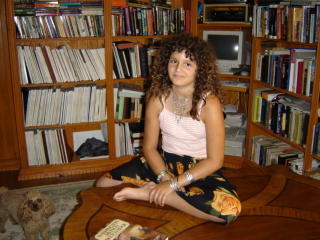 This is a photograph of a child, obviously a female child. She is only nine years of age, a beautiful child to be sure. This child is lovely to look upon; one can imagine what the adult version of the child will look like. Clearly her genes have favoured her very well. To look at this child, this nine-year-old, as a sexual object would be nothing less than obscene. Could anyone, any reasonable individual disagree with that statement? I think not. Yet there are among us people who suffer from a grievous pathology, people whose objects of desire are children. These people are pariahs among us, these sexual psychopaths, yet at times their orientation and behaviour appear to be forgiven, in the name of art.
This is a photograph of a child, obviously a female child. She is only nine years of age, a beautiful child to be sure. This child is lovely to look upon; one can imagine what the adult version of the child will look like. Clearly her genes have favoured her very well. To look at this child, this nine-year-old, as a sexual object would be nothing less than obscene. Could anyone, any reasonable individual disagree with that statement? I think not. Yet there are among us people who suffer from a grievous pathology, people whose objects of desire are children. These people are pariahs among us, these sexual psychopaths, yet at times their orientation and behaviour appear to be forgiven, in the name of art.
There's been an unfortunate renaissance, a kind of literary reminiscence, of the work of Vladimir Nabokov lately, and more specifically his best-known novel, "Lolita". At the time of its publication, this novel engendered much controversy among those who believed it to be a piece of genteel pornography, as opposed to those many others who hailed it as a breakthrough in reality fiction. I read the book shortly after its publication. The reason, primarily, was that at the time I was a devotee of Russian literature. As a young woman I had read Gorky, Checkov, Dostoevsky, Tolstoy, and enjoyed them all, considering their outpute a high form of the literarature, a novelistic taste of real life. Although I found Nabokov's novel well written, amusing and interesting, I found it also rather deplorable. As a young woman whose memory of her girlhood was not that far behind me, I thought the focus of the novel to be lamentable, if not downright criminal. That put me squarely in the pornographic camp, those who considered anyone who thought it a legitimate literary device to have an older man have sex with a girlchild with the time-worn lament/excuse that he was seduced by her, to be a sad and sorry excuse for a human being.
I have the greatest respect for the keen scientific mind of our youngest child who also conveys the indelible conviction of the socially-conscious adult, yet even he, several years back, casually mentioned that he had recently read the novel and thought it to be an excellent work. I sputtered my annoyance with his take on the book and explained why. This conversation took place long distance over a telephone call and we never did explore it again. I know, knowing my son, that he likely considered Nabokov to have been "misunderstood", the victim of a tyrannical literary establishment, aided and abetted by shrill old biddies. On the one hand I was delighted that my son had turned to 'classic' literature as a break from the scientific papers he usually confines himself to; on the other hand I felt real distress that this young man who truly is a well balanced individual, totally committed to the understanding of equality between the geners might consider the thesis underlying the book to be a legitimate one. It is not.
Children, emerging adults, are sexual creatures. To be so is in our nature, written into our genetic structure. Nature has so designed us, for future procreation. And to ensure that procreation will occur she has created within us an indelible sense of curiosity as well as physical pleasure. Young girls, even before the kind of hormonal insanity that disrupts normal behaviours and expectations, are curious about things that, within most societies, including ours, remain verbotten topics.
Yet there are some societies, rare though they are, that could conceivably teach us something about preparing young people for adult status as regards sexuality. The late anthropologist, Margaret Mead, published a study which shed light on an enlightened social practise which became the norm in a country, Samoa, which most people might feel was a primitive one. This was a society, nonetheless, which recognized that an emerging consciousness about one's body and its hormonal-altering imperatives must be met with sensitive instruction to ensure a healthy metamorphosis among young boys and girls into responsible adulthood.
Unfortunately, we live in a society which prefers to keep information about sexuality under tight wraps. So children are left to wonder, to speculate and to experiment. Young girls, just as young boys do, create imaginary scenarios in which everyone is a happy, innocent participant, and by the process of fulfilling some kind of physical act of which they're not totally aware, everyone's curiosity is satisfied. I'm not certain myself that I would advocate for a system anything like that which Samoa employed in educating their young about sexuality, but we haven't done a very good job of it to date.
That's still not the point at hand. What is more to the point is that children are curious, they want to know about everything, their imperative is to explore, to discover, regardless of the topic at hand, regardless often, of the outcome. They cannot really visualize the outcome of an action they take if they haven't had any experience, if their knowledge about what they're about to undertake is rudimentary at best, absent in the worse-case scenario. When I was fourteen, I wasn't quite certain just how close you had to come to full intercourse to become pregnant. When I was six or seven years old, a single middle-aged male who lived in a room on the floor of the flat my parents rented did his utmost to interest me in his genitalia. When I was eight, the teen-age boyfriends of the two older boys who lived in the bottom flat sometimes trapped me in the shared bathroom and attempted to encourage me to view their, as well.
As a child, playing with my girlfriends, we would speak in hushed tones about "strange old men" who did odd things, and went looking for little girls. This, despite the fact that we had no idea what strange old men did, and why they looked for little girls. But the horror of the possibilities inherent in those thoughts both thrilled us and frightened us. I wasn't too much older than that when my mother's sister's husband spoke encouragingly to me about doing certain things with him (oblique references which I did not comprehend), and he would give me a purse, just like the one he'd given his daughter, my cousin, several years older than me.
This happens to girl children. I'd like to think that many men may think about such socially-verbotten things, but are never serious about acting them out. I'd like to believe, hell I do believe that most men would no sooner behave in this manner than they'd fly off rooftops, that to do so would be of utmost repugnance to them. To claim, as some men will do, who are convicted psychopathic child-abusers, that a young girl or a young boy led them on is beyond the pale. An adult should know about restraint, not propriety, should respect the integrity of a child's being, not believe that no harm will be done.
Vladimir Nabokov obviously thought otherwise. He was wrong.
In Whose Name?
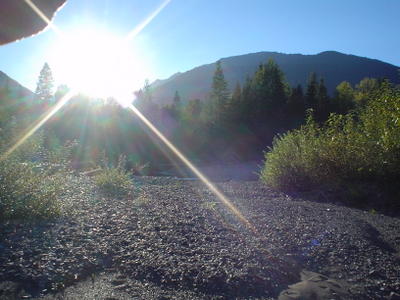 Whose inimitable name is invariably invoked when religious fanatics wreak havoc in the world? The Great Spirit, Jehovah, Yahweh, Allah, Buddha, you name it. Some cultures go one better than simply confine themselves to a mono-spirit. China and Japan and likely Korea as well had no fewer than (is it?) eight Immortals to each of whom was attributed some sought-after virtue like happiness, long life, prosperity, you get the picture. These are powerful figures, these all-seeing, all-knowing, frightening, comforting beings who look down kindly or awfully, as the case may be, on the little figures of mankind who inhabit this world.
Whose inimitable name is invariably invoked when religious fanatics wreak havoc in the world? The Great Spirit, Jehovah, Yahweh, Allah, Buddha, you name it. Some cultures go one better than simply confine themselves to a mono-spirit. China and Japan and likely Korea as well had no fewer than (is it?) eight Immortals to each of whom was attributed some sought-after virtue like happiness, long life, prosperity, you get the picture. These are powerful figures, these all-seeing, all-knowing, frightening, comforting beings who look down kindly or awfully, as the case may be, on the little figures of mankind who inhabit this world.
If there truly is life in other worlds in other galaxies within the Solar System would those other life forms have recognized in their way the utility of such a construct? Might they too have envisaged spirits directing their evolvement, both physical and spiritual? Might these life forms confine themselves to disparate groups, clans which seek to exclude the stranger, and whose other groups recognize their own guiding spirits? Is it possible that these life forms, perhaps different than ours, perhaps not, squabble among their clans and seek to expand their territory, claiming their spirits to be more powerful, more dread-inspiring than the others'?
In whose name, pray tell, (even the language reflects in so many ways the general and often all-encompassing belief in an inspired being whose sole purpose is to direct the lives of its humble adherents) does one group feel confident in claiming that their version of God is superior, more meaningful, in fact the only and one true God whose wrath will be brought down on unbelievers, infidels, atheists? Does their god move them toward these hostilities?
I AM THE LORD THY GOD, THOU SHALL HAVE NO OTHER GODS BEFORE ME. That's pretty authoritative, all right. But who wrote those words? Who proclaimed that great presence in the ether to be god, the one god the only god? Show me and I will believe. Faith is not in my lexicon. Were you to show me a powerful, a meaningful, and compassionate and fair construct whose guidance would lead mankind to peace I might be persuaded to believe that all things are possible.
We have such a construct called history. A recounting of events which occurred pre- and post-historical accounting. Did early man look up to the dark skies above, view the sun and the moon and the stars and tell himself that there is some mysterious meaning to their existence, overlooking the puny, frenetic activities of Homo Sapiens? What genius persuaded others of his ilk to hail the discovery of a Supreme Being?
This is a large world we inhabit. It still holds many secrets which man has not yet unravelled. The world can be, and very often is, a frightening place. Frightening because frail man cannot control the elements. Nature: the natural world does not lend itself to man's pathetic attemps to control her, where the cumulative technology which man can bring to bear in his sad attempts to force nature to conform to man's desires result in fear and resentment. Nature is benign, she is hostile, nature is.
What we cannot understand, what we cannot control makes us fearful. Better, far better to believe that our maker was not a long natural evolution to become a bipedal brain, but rather an objective experimenter whose leisure activities brought us into existence. Therefore we bow low before our maker, we render to our maker obeisance, we believe our souls belong to our maker, that our maker controls our existence. Oops, isn't it 'tother way around?
Ah, do we control our behaviour? Do we worship our maker and understand our maker to wish us to bring those who remain wilfully unpersuaded of our maker's demands into our maker's fold? Does the true believer perhaps understand that those not of his clan, his belief, have no business inhabiting this earth which the one true God has given to his adherents alone? We exist to exalt our maker, and for no other reason?
Must be, since that is what has been happening throughout the dawn of history to the present time. Could we possibly conceive of a higher order of being whose amusement is the chessboard-ordering-about of mere mortals? Well, the Greeks certainly did, did they not? There we have an astounding phalanx of gods, is that not so? Did they not dabble in the concerns of mankind, did they not toy with them, did they not conspire among themselves to inspire humans to become envious of one another, to become corrupt, to become murderers, rapists, robbers. Was it very difficult for these immortals to move mankind in the direction of these dark emotions?
How maniputable we are, how fey. How sad that we steadfastly refuse to take responsibility for our actions. How dreadfully insecure we are, how horribly human.
Funereal Weather
If we haven't already awoken, Riley invariably will wake us up, if it's after eight in the morning. Riley sleeps under the blankets, either at my back or thereabouts, or down at the foot of the bed hard against Button who prefers to sleep on top of the blankets, at the foot of the bed, on her own pillow, covered by her own blanket. Creatures of habit, right? This morning Irving got the jump on Riley and got up to the bathroom just before eight. When he got back in bed he began reading his novel, but when he glanced over at me he could see I had my eyes wide open, watching him. He leaned over, gave me a kiss, put his book down. Too late, Riley noted we were awake, and tunneled his way out from under, leaping over me to get at Irving. He thrusts his little snout at Irving's face, first one way then the other. Time to get up, let them out for their morning micturation otherwise known as pee-time.
We always put their breakfast bowls on the floor of the bathroom while we're showering. Button has her food first, then Riley; he needs encouragement, she doesn't. Why do we feed them while we're showering? Because they're trapped in there, door closed, and haven't much choice. They're both so sticky about their breakfasts it's a relief to us when they eat, skinny little mutts.
Sunday breakfast often consists of a half cantaloupe, banana, (orange/grapefruit juice for Irving too) sausages, french toast, coffee/tea. When Button and Riley smell sausages cooking they're very patient about their portion. Irving puts down little white dishes for their after-breakfast cookies; they get a choice. They always select their favourite first, then Button, who is larger and eats more and faster, raids Riley's dish before her own, while Riley runs upstairs with his cookie to try to hide it where Button won't get it, because he is too full to eat it then and there. After this daily ritual, they're presented with their own little dishes of cut-up sausage, and we set about ourselves to eat in peace.
Irving goes out to the front garden and brings in our sole ripening melon off the vine. Too soon, he should have waited, I told him so - it's still too green on one side, and when I knock it, it doesn't sound ready. He goes downstairs to use his router to cut out pieces he's using to decorate the panels he's installed on the walls of our upstairs hall, an ongoing project. I clean the kitchen, the powder room, the two upstairs bathrooms. And then I decide, because it's raining out and we aren't going out just yet for a ravine walk, to (ugh) polish the silver. Those are silver candlesticks, teapot, large tray, items which were wedding gifts more than 50 years ago and which I keep threatening to send to the Sally Ann, but Irving wants to keep them. He comes upstairs, knowing how I hate polishing the silver, offers to do it, but when I refuse, he says he's going to spray them with lacquer so I never have to do that hated task again.
He's upstairs, gluing on the little petals, and I decide to cut my hair, it's gotten kind of rough looking. I set about the task with mirror and scissors. I'm used to it. I can get away with cutting my own hair without disastrous results because my hair is fairly curly and mistakes have a way of hiding themselves. Irving comes in to inspect, says it looks fine, he doesn't have to do any touch-up; he's good at that.
The rain has let up, and now it's only drizzling. Charles, one of our next-door neighbours has just lost his mother. A brain embolism, I think, though they're not certain. Yesterday afternoon Susan came over with a card, thanking me for the one I sent them. Her card has written on it in her careful script the name and address of the funeral home should we wish to drop by. So today we decide that I'll dress for the occasion, and Irving will wait for me, with Button and Riley, in the car. I put on a sweater set, a long skirt and dress shoes, and we set off. At the funeral home in salons 1 and 2 there are perhaps a dozen people standing about as I enter. Charles sees me almost immediately and comes toward me, a shy smile on his normally reserved face, as he thanks me profusely for coming. I see his father standing nearby and approach him. He's half the height of his son, wizened and small, 89 years old, burying his 86-year-old wife. He's hard of hearing, and Charles quickly writes key words for his father to read, identifying me, conveying my message of sympathy. There's a board hard by us with family photographs and Charles's father stands beside it, pointing out for my edification various family members at varying points in history. I love photographs, particularly family photographs and these become precious to me for the moment, conveying the sadness of a fading family scene.
Charles's son Nathan, 10 years old, wearing a new haircut and a brightly coloured shirt comes over and greets me, and points out to me a photograph of his older sister when she was four. By then I'm speaking with Charles's sister Madeleine, eleven years his senior, born when their mother was 23 years old, newly married. She's a few years younger than me, short, stubby, plain face, good smile. In all the years she's been visiting her brother, niece and nephew on a weekly basis, we've greeted one another rarely, but we know one another. She's quiet, well spoken and painfully shy. Never married, always lived with her parents, now parent, in the singular. She bears no resemblance to Charles, neither physically nor in her manner. They're both introverts, both truly decent people, but they shun the presence of others. Traits which Susan attributes to the poor mothering of her mother-in-law.
I speak briefly with Sarah who is in company with Shannon, another little girl who lives on our street. Shannon has come with her parents and her twin brother, also to pay respects. Sarah is a tall, gangly girl, burdened with her father's truculence, spared by a reflection of her mother's brilliant smile. On this occasion she is happy to speak with me, softly, shyly. I've never been able to understand why these two children, who have known us all of their lives as the people who live next door appear to be unable to connect in the most elementally social way. With heads averted (like their father) they walk on, hoping not to be noticed. She's holding up well, she tells me, when I ask how she is.
There are lovely sprays of brilliant flowers above the bier. I see the cold white figure of Albina Eugenie laid out for last regretful goodbyes, but I do not approach, I don't wish to, and no one suggests that I do. Susan, her large and bright presence lightening the gluey atmosphere, approaches and we hug. She wants me to come over to where her mother-in-law lies, so I can see closely how lovely she was when she was young, to view a large photo of her which sits beside the casket. I demur, we speak briefly, share a few light moments, then he thanks me for coming along, and we promise to see one another on the morrow. I make my goodbyes and leave the premises to join my husband in the car.
Once home, we change into suitable gear for a ravine walk, and that includes raincoats since it's still spitting. Out in the ravine everything is dripping, the creek is running, rushing madly with its new supply of water, leaping over downed branches, curling around bends, under bridges. The trees host brilliant greens, a few new and different fungi have erupted here and there, the small pale heads of asters are bent with the weight of the rain. There are places on the trail where the canopy is sufficiently dense so the dirt is dry underfoot, but not many; this rain has penetrated very well.
Later, Irving goes back to his woodworking, and I print off a letter to our older boy in Toronto from the computer in the library. From the on-line computer I email a letter to the editor of our local paper, commenting on my changed opinion of our governor-general designate whom the paper has revealed had made a speech critical of the country's official multiculturalism. She has taken the intellectual and philosophical view that the official encouragement of cultural and ethnic ties encourages a ghetto mentality and discourages full acceptance of citizenship, as well as the obligations inherent in that citizenship. I fully agree, and have therefore a higher opinion of this woman than heretofor.
I find a very brief, but oh so welcome email from Jody, who is now in Sweden at the workshop he'd been preparing for, following his conference in Alaska. It's only week one of his two-week stay there, then he's off to Italy for another two, three weeks. The workshop, he says, is going very well. For the coming week they're going off to visit some rivers, and he'll let me know all about it in good time.
I make an on-line donation to the Canadian Cancer Society in memoriam. The Society will send an acknowledging card to the Algozino family. They had suggested, in the newspaper (you know, 'hatch and dispatch'?) that one could make donations to the charity of one's choice. From where I sit, in one of the spare bedrooms where the on-line computer is installed in an armoire, Button and Riley keep me company, sleeping on the bed beside me. I also write an email to the proprietors of the cottage where we stayed in New Hampshire a week ago. Thanking them for their hospitality and the use of their accommodation. I had to mention the pervasive odour of mould, though, and ask them if they have alternative accommodation free of mould. I hope they won't take offence.
It's been an interesting day, but not that interesting. Interesting, I suppose, that the weather appears to be commisserating with a family in mourning. We're still reading news of the U.S. Gulf Coast hurricanes. I feel exceedingly grateful that the hurricane named after me was slightly less vengeful than its predecessor. Having said which, it still remains a disaster for the many people affected so tragically, so many lives in tatters. That's life, always better than the alternative, no matter what it brings.
Track and Field - and Training Bras
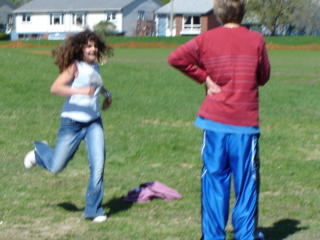 She signed up for track and field again. She had quite enjoyed it last year at school, and had decided she would go for it again. This year, though, some enthusiasm seems to be in short supply. She can't, she has confided in me, run fast enough. The smaller, lithe (read: skinny) kids have a far easier time of it; their limbs conform far more readily to the exigencies of concentrated motion than do hers, evidently. We try to encourage her, to tell her she has to give it more time, become accustomed to the physical stress, that it's good for her. She isn't dreadfully impressed with our arguments in favour of encouraging her to persist. She may be only nine years of age, but she's nobody's fool. If she isn't having enough fun, if it doesn't seem to be worth her effort, if she sees other, more streamlined children achieving a far better result more effortlessly, she'll give it up.
She signed up for track and field again. She had quite enjoyed it last year at school, and had decided she would go for it again. This year, though, some enthusiasm seems to be in short supply. She can't, she has confided in me, run fast enough. The smaller, lithe (read: skinny) kids have a far easier time of it; their limbs conform far more readily to the exigencies of concentrated motion than do hers, evidently. We try to encourage her, to tell her she has to give it more time, become accustomed to the physical stress, that it's good for her. She isn't dreadfully impressed with our arguments in favour of encouraging her to persist. She may be only nine years of age, but she's nobody's fool. If she isn't having enough fun, if it doesn't seem to be worth her effort, if she sees other, more streamlined children achieving a far better result more effortlessly, she'll give it up.
We think it's good for her to continue. Not just for the conditioning which she could use in greater physical activity, but we were also aware of how much she enjoyed the cameraderie that went along with last year's interschool meets at the season's conclusion. All of this is good for her physical and social development. But there are other areas also which can be of use to her development.
She's always liked her teachers throughout her school years, including a year of preschool. This year is an exception. She thinks her home room teacher is dour and fixated on discipline. "She treats us like kindergarten kids, Bub" she told me. Evidently all of this new teacher's previous teaching experiences have been in the early primary grades, and our big little girl is now in grade four. None of her little coterie of friends like their teacher, either. Angie is, though, very enthusiastic about her arts teacher, she likes her social studies teacher - and, alas, she very much dislikes her French teacher, lamenting the loss two years earlier of another French-language teacher whom everyone adored. Worse, this year her home room teacher will teach music which will likely mean that all the strides Angie made in learning to read music, to play recorder with great flair may be for naught.
Yesterday Angie was wearing a sleeveless tie-dyed, front-tied shirt, very attractive with her nice jeans. I peered surreptitiously at my grandchild while she was busy with this and that, and decided, yes, definitely, she was wearing a bra. At nine years of age, wearing a bra. Truth to tell, my neighbour from across the street did take me aside a few months back to tell me she thought Angie was becoming rather 'developed' and she thought it was time her mother got a training bra for her. I protested she was too young. Now, seeing Angie with what was unmistakenly bra straps peeking out from her sleeveless shirt, I thought perhaps there was utility in that. But I said nothing to her. Not wanting to embarrass her? I don't know.
In any event, when her mother telephoned early this afternoon before Irving went over to the school to pick Angie up, she said Angie was wearing a pair of her chunky-heeled boots (they now take the same size footwear as well as clothing). And she also mentioned that when she was doing the laundry last evening she came across a bra she hadn't recalled wearing herself and asked her daughter about it, at which point Angie told her mother she had worn it. And here I thought Karen had bought Angie a training bra. Angie, that little devil, had gone into her mother's underwear drawer, just as she often goes through her clothes cupboard (Karen permits Angie to wear some of her clothes) and had selected a bra for herself. Karen laughed when she told us this, and opined that it was because Angie's girlfriend Stephanie, who had slept over with Angie on the week-end wore bras, as did another of her schoolchums. And to think, these are 9-year-old little girls, shorter, skinnier than Angie!
She wasn't wearing a bra today, and I discussed it with her. If she wanted to wear a bra, I told her, she should wear a training bra, not one of her mother's. And anyway, she had lots of time to get around to that kind of thing, and didn't have to be physically uncomfortable just because her friends wore them. No, she said, it was comfortable enough, and she felt better wearing one yesterday because the front of her blouse was low. She certainly had a point there. I hauled her upstairs to my armoire and shuffled about looking for something resembling a sports bra (I never wear anything resembling a bra; now I'm retired, no longer in the work force I can do as I please) and pulled out two short stretch tops with spaghetti straps. "Neat", said the emerging clothes horse, they would do.
Chicken Soup and Rice
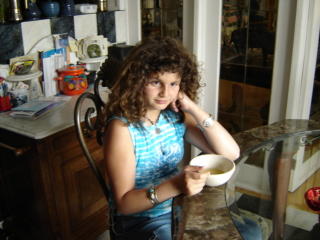 For some unknown reason none of our children would ever stoop so low as to eat chicken soup and rice with us of a Friday. After all, it was an integral part of the meal, but neither our oldest boy, our middle girl, our younger boy would eat chicken soup and rice. Without it there was ample for them to eat; roasted chicken, often also a tomato/green pepper dressing, potato pudding (oh, that's right; they would never eat potato pudding (potatonik) either, so for them it was roasted potatoes), augmented by a vegetable like cauliflower (which they also weren't thrilled with). I'd also bake my version of croissants, cheddar cheese laced, and that garnered a more enthusiastic reception. And never, ever, was dessert rejected; raisin pie, like a big buttertart being the favourite. Well, that's history. In a sense, for they're no longer young, no longer share Friday night meals with us. But when they do, it's the same old story.
For some unknown reason none of our children would ever stoop so low as to eat chicken soup and rice with us of a Friday. After all, it was an integral part of the meal, but neither our oldest boy, our middle girl, our younger boy would eat chicken soup and rice. Without it there was ample for them to eat; roasted chicken, often also a tomato/green pepper dressing, potato pudding (oh, that's right; they would never eat potato pudding (potatonik) either, so for them it was roasted potatoes), augmented by a vegetable like cauliflower (which they also weren't thrilled with). I'd also bake my version of croissants, cheddar cheese laced, and that garnered a more enthusiastic reception. And never, ever, was dessert rejected; raisin pie, like a big buttertart being the favourite. Well, that's history. In a sense, for they're no longer young, no longer share Friday night meals with us. But when they do, it's the same old story.
So, lo and behold who has developed a downright fondness for chicken soup and rice? None other than our sole grandchild, that's who. On Friday afternoons, coming home from school she asks for chicken soup and rice. Oh, and Bub, would you mind sprinkling in some of that green stuff? Parsley, sure. Would you like it fresh from the garden? No, Bub, the dried stuff is good. One bowl will not suffice, having cleared away the first she enquires after a second, and guess who is delighted to comply? For her chicken soup I use the bowl that her Uncle Jody had made for her years ago, inscribed on the bottom with his initials, the date, and her name. She has many other pieces of the pottery he has made, even a wonderful teapot which I covet, sits in her bedroom, for her use at a later, much later time in her life.
Today, for example, take today. I'd done the food shopping and bought fresh raspberries for her. On the table I'd set out a small glass bowl of washed raspberries. I watched fascinated, as she had a brimful spoon of chicken soup, then she would delicately select a raspberry and have it - then another spoon of soup. Ugh, my god, but who am I to judge? "Mmmm", she murmurs in her inimitable way, "good"!.
All right, two bowls of chicken soup, the dish of raspberries. Then, what's next on the menu? This is one hungry after-school little girl. What kind of pie did I bake, she asks. Apple, it's an apple pie, would you like a piece? Well, of course, Bub. Why is it so red inside? Because, her Bub explained, a few tablespoons of the blackberry jam that her uncle had made last fall was stirred in with the apples. Nice colour, hey? Like some chocolate milk with that? The real stuff? I bought chocolate milk today. Well, yes, of course.
Little bottomless pit.
The kid is a bottomless pit!

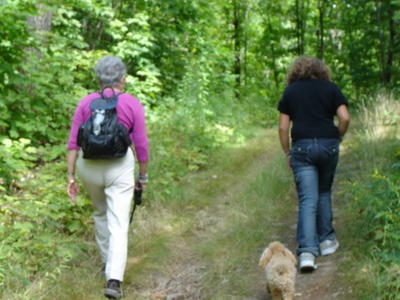 It's a joke, of course, but it's true. That old canard about Jewish mothers/grandmothers relishing nothing so much as urging their children/grandchildren to eat, eat. I suppose other ethnic groups are similarly blessed with such concerns and amusements; Italian mothers/grandmothers, for example. Well, it does make me feel good to see people eat. Most particularly pint-sized people, children. Except that this particular child isn't so pint-sized. She is indeed anything but. She is perilously close to my size and height, at age 9. And a tender age 9 at that, not even halfway through her ninth year.
It's a joke, of course, but it's true. That old canard about Jewish mothers/grandmothers relishing nothing so much as urging their children/grandchildren to eat, eat. I suppose other ethnic groups are similarly blessed with such concerns and amusements; Italian mothers/grandmothers, for example. Well, it does make me feel good to see people eat. Most particularly pint-sized people, children. Except that this particular child isn't so pint-sized. She is indeed anything but. She is perilously close to my size and height, at age 9. And a tender age 9 at that, not even halfway through her ninth year.
She signed up for outdoor extracurricular activities again this school year. So she's back into running. Where last year she enjoyed it, although it's still early days, it appears she isn't as taken with the activity now. "Hard work, Bub" she tells me. She isn't running fast enough, she says, the gym teacher tells her she has to run faster to qualify, to be part of the team. There are other children whose running prowess remains unchallenged; these are thin little boys and girls whose ease in moving their nether limbs in perfect synchrony, style and speed seems perfectly effortless. I encourage her to remain with the effort, to give it more time. She gives me a perfectly crooked look and a grim smile. Then she reaches into her backpack to extract a library book she's taken out in preparation for a book review due...when, I ask?
Another look, and she pulls the little glass dish with the sliced-up peach out of my hands, taking it over to the kitchen table. I tell her I made panzerotto for dinner last night, and did one for her, does she want it? You bet, Bub. Hers has only tomato paste, mozzarella cheese and sweet basil from our garden. Ours was loaded down with tomatoes (from the garden of course), green/red peppers, mushrooms galore. For me Romano beans, for Irving pepperoni. She proclaims them eminently edible; better, she says, than the store-bought ones. That's how grandmothers achieve satisfaction of the utmost variety.
Peach consumed, ditto the pizza pocket. What's next, Bub? How about some chocolate milk? All right, she accedes; did you buy chocolate milk? No, I admit, but I can make some using chocolate syrup and plain milk. No, she doesn't want that. How about a milkshake? Yes, very well yes, she agrees. Vanilla or chocolate ice cream? Chocolate, thanks. And with it, she says, can I have one of those muffins? I gasp, ask can she eat a whole muffin after the pizza pocket? Oh sure, she assures me, and proceeds to do just that.
In between bites she begins to read to me from the library book. The title is "The Hole". I'd never heard of it, but she tells me she's seen the film, and it was very good. The opening chapter sets the scene: a hot, dusty locale in Texas wherein lurk scorpions and rattlesnakes. Completing the first chapter (admittedly only two pages in length) she decides to just relate the story to me as though it were indeed a book review as obviously she cannot do so reading the entire 50 chapters which comprise the book. I learn all about the story and discuss elements of it with her, taking the greatest pleasure in watching the mobility of her face while she's explaining things to me.
What else can I have? she asks. What else? I repeat, why nothing, you've had enough until dinnertime. We both settle for a ball of bubble gum. Boy, can that kid pack it away.
Welsh-Dickey clamber
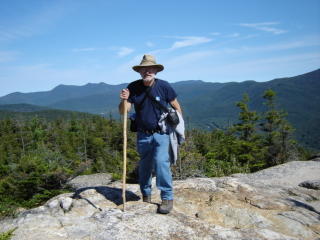
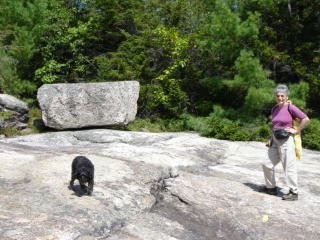
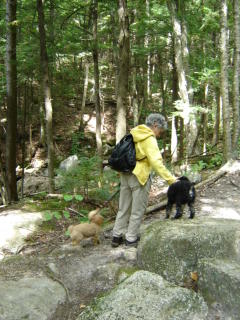 We did it. I certainly had my reservations, but I was also determined. It isn't that we lack determination but at our age the energy reserve is somewhat wanting. Despite which, although the ascent to Welsh and Dickey took us considerably longer than it had in the past, we did ascend successfully and well. And lived to enjoy the experience.
We did it. I certainly had my reservations, but I was also determined. It isn't that we lack determination but at our age the energy reserve is somewhat wanting. Despite which, although the ascent to Welsh and Dickey took us considerably longer than it had in the past, we did ascend successfully and well. And lived to enjoy the experience.
Looking at the photographs we took during the ascent of the two mountains I recall the pleasurable, not the onerous parts of the enterprise. We saw truly spectacular views of the surrounding mountains; Irving pointed out Tripyramid to me, and there were others. I remember, maybe twenty years ago, we had been climbing Tripyramid, one of the peaks anyway, Irving and Jody and me, and somehow I became really frightened at the sheer drop everywhere I looked, there seemed to be no comfort in the rockface we were climbing over, I felt completely vulnerable. I sat down and just refused to go any further. Disappointed, my two companions agreed we would have to descend, and believe me my personal descent began on my arse as I feared descending upright and I must have resembled a crab, edging my way arsewise down the rockface, until finally reaching a point where I felt sufficiently secure to continue on foot.
I never did feel that way about any of the other climbs we'd done. Mousalaki wasn't bad, although there were always points in the ascent which worried me. Little Haystack was the last sizeable climb we'd done, years ago. I really liked Mount Clinton, thought that was really the most comfortable climb, as well as the Coll leading over to Mount Eisenhower. Lafayette was a challenge; difficult enough up to the hut, but from then on up to the very summit it was agony. The view, though, the incomparable views. That's the point, isn't it? That, and pushing your body, your resolve to its very edge of endurance. It made us laugh away back then when the children were emerging young adults, climbing with us, after we'd completed Lafayette (we had a year or two earlier climbed only to Eagle's Cliff) to read that some truly enthusiastic and fit climbers actually ran the ascent and completed it in a truly impossible time frame, bearing heavy backpacks. Argh! Still, we managed as a group to always complete the climbs we undertook somewhat under the average time-frame given, a matter of some pride for us.
We had arrived in New Hampshire on Saturday, settled in to the cottage, did the food shopping. There was frost overnight and we looked forward to a cool day Sunday although the longer range forecast was for unseasonably hot weather for the balance of the week. So Sunday it would be, our most physically arduous effort of the week, doing the Welsh-Dickey circuit. No big deal when we were young, since they're only 2600 ft. and 2800 ft. respectively, but at our age, nudging the big 70, an effort. The day started out cool and we dressed accordingly, and although the temperature didn't reach much above 68 finally, the strenuous effort combined with a clear sky heated us up considerably. We plunged into the forest at the trailhead, Button off leash, Riley on the retractable leash, all of us happy to be there. The ascent at first is gradual but intractible, requiring a steady effort. For me far more difficult than for Irving, and I was forced to stop to rest often. Other hikers were passing us steadily and I didn't much care, was glad to cheer them on. Irving waited patiently with me until I was able to continue. For us a vital part of the climb is just being there, looking around at the trees, the undergrowth, the remnants of wild flowers; at this time of year mostly asters and goldenrod, but we could see where much earlier Ladies Slippers had bloomed in profusion, even trilliums still had foliage left as evidence they had once bloomed there. Despite our constant stops and starts we proceeded up the trail through the mountainside forest of Jackpine, spruce, fir, yellow birch and oak.
When we finally reached the first lookout it was with a bit of surprise that we had managed to get to that level, given my constant need to rest on the way there. We admired the lichens, the mosses, we and the pups staying on course lest we disrupt their fragile presence on the rough rockface. Truth to tell, it's tough to do otherwise, since local environmentalists/volunteers ensure hikers do just that by laying down branches to direct hikers' boots steadily on the path. We gave Button and Riley water, had a short rest (scant refuge from the relentless sun there), looked out over the cliff face to the arras below, then resumed our ascent.
Slow, steady work, and work it certainly was, for us. Still, happy to see on either side of the trail, rhododendrons and blueberry bushes, imagining the brilliant colour when the rhodos were in bloom, in the spring. We did see some dried-up blueberries that the bears, presumably, missed. (Only I doubt there are bears in these mountains. You don't have to go too far in the Ottawa area, just up to Gatineau Park to find bears, small black bears, and they compete with us for the jewelled berries of the season.) The large expanses of rockface might seem daunting to those who hadn't been there before, but once you hoist yourself up to the rock shelves, you lean your body into the effort and slowly, gradually, gain height. Our two dogs, on their little padded feet were doing just fine, although Button, older than Riley by six years, needs constant compliments and encouragement and the occasional drink of water. On the other hand, she likely recalls this climb. Although they both did it with us last year and likely the year before, I'm not certain Riley recalls it. When we come to really high rock shelves that we have to clamber over Riley panics, he knows it's too high for him to jump up to, and he feels threatened by that. I stoop down and lift him over and he's fine. When these rocky shelves are high enough, they pose a problem for Button too and she gets lifted over. We thrust ourselves carefully through rocky defiles, always looking for the next marker, yellow daubs on the rocks to indicate the way.
A young woman with a large dog, part German Shepherd, has stopped below us to rest, and soon climbs again and overtakes us. She, laughing, agrees with me, that our legs aren't accustomed to this kind of punishment. I can see evidence that young women in their 20s and 30s, sometimes accompanied by male companions are experiencing symptoms similar to mine; lungs gasping for air, legs heavy with fatigue. But they're young and these symptoms are transitory, and they forge on at surely twice the speed we can manage. Then an old geezer like us, gasps gamely alongside us for a short while before he too leaves us in his determined wake.
The sun is hot, although there's a blessedly cooling breeze wafting over us. We're no longer in the shelter of trees once we've gained the bald rock face and struggle upward. Button, clever girl that she is, seeks the shelter of shade wherever she can, but it's becoming less and less possible for her to do so, and she pants continually. Irving climbs, as he hikes, using a stout stick and that helps, I know, but I've never been able to become accustomed to holding one. All the more so as I'm holding Riley's leash in one hand and need the other to grab onto things from time to time, to hoist myself, grasping the rock face, up over the rock at various points. Irving is managing much better than me, and he offers me his hand often. I eschew his aid, for two reasons, the more important one of which is that I want him to focus on his own well being, not mine. Last time we were up here it had been after a rain, and the many little depressions in the rock face we scramble over were filled with water, and Button had stopped often to drink from them.
Just when I think I can't manage to clamber upward any more, another expanse of rock faces us and up we go, steadily, slowly. We turn back often to look at what we've left behind us, see the first lookout far below us, marvelling that we've come so far. Irving has been taking pictures with his camera at these times, and occasionally he'll sneak a quick one of me and the dogs as well. I'm too tired to notice much of that, but never too tired to stand, enraptured at the arras before us, the peaks of shorter mountains that surround the one we're on.
When we reach the summit we sit briefly, hand out a few favourite treats to Button and Riley. Riley is seated beside us, but not Button. She has crept down slightly and is crouching under a bit of shade being afforded by low-growing conifers, stunted by the weather at this altitude. She leaves her shade reluctantly whenever I urge her to come over and retrieve another little treat. Then it's time to carry on, and we do. Irving proceeds boldly descending to the Coll and I'm considerably more cautious, half-sliding down the first few precarious feet on my arse, until I feel sufficiently secure to stand upright and proceed in the descent decently. The cairn looks somehow shorter, smaller, than it had in previous years, and the sign is gone. We proceed in the ascent, through a small bit of forest, then back onto the bare rockface again, and up, up, up. We come across a young man carrying two walking sticks, clicking them along the rockface as he proceeds. He's got a sweetly cheerful manner and stops to talk with us awhile, cheering us up considerably. We say our good wishes to one another and he proceeds in the opposite direction to us (he climbed Dickey, then Welsh) and we mount Dickey, looking about, and actually now looking down at the summit of Welsh which we'd left just a short while earlier.
My favourite part of this circuit is ahead, as we trek from one rockface, in our descent, to another, gradually, but relatively quickly in comparison to the ascent, losing height. Again we dip for a short while into the forest, then a switch-back takes us back onto the rockface, all the while descending at a fair clip. Button and Riley have picked up their gait by now as well. Irving mentions that the toes of one of his feet are a little sore in the descent. Soon we've dipped down off the last of the rock ledges into the forest and from then on we're on the trail, descending, careful to avoid treacherous exposed roots and maintaining balance on the scattered rocks on the surface of the trail. We're not descending at a mad pace, but rather a measured one. My knees are feeling wobbly from the pressure of the ascent and the time on the move, and Irving's toes are really bothering him.
Small groups of people pass us cheerily, in either direction. Those ascending are slower and even slightly grim in the process, while those descending as we are, appear light-hearted about their endeavour. I tell a group in the ascent that they're headed in the wrong direction. Good for a sardonic grin. A group of four people, two men, two women, and a large yellow Lab pass us, but soon afterward we hear a commotion and realize that they're running back up, toward us. I ask whether the dog had unearthed something like a porcupine, because they appear concerned about the dog, pouring water on it. But no, it appears that there are wasps somewhere close ahead. We briefly consider bushwhacking a short distance but it seems kind of overkill, and we decide to proceed. The four tell us that if we don't experience any problems, they'll proceed after us.
Well, what do you know? There are wasps at the side of the trail and they do go after us. Button and Irving mostly, because they're ahead. Irving beats them off, speeds ahead after picking Button off, and begins to actually pull the bloody things off her, off her eyes, his midriff. So I do bushwhack, carrying Riley, until we pass the area where the wasps have gathered, as do the other trekkers. By that point we're fairly close to the trailhead, and another half-hour of steady descent takes us there. Actually, we're kind of trying to keep up with Button; her trauma revolving around her distinct hatred of biting, stinging insects has her anxiously trotting ahead, us trying to reassure her that the bloody wasps are no longer with us.
When we get to the parking lot, we see a group of three men whom we recognize as having passed us just shortly before the four people with the yellow Lab had, and Irving asks them if they'd had an encounter with the swarming wasps, and they hadn't. Really? How interesting, just our luck. But we couldn't let a little (relatively speaking) thing like that spoil our day's adventure, and we don't. Button has a little swelling over one of her eyes, and Irving has a number of stings on the fingers of one hand, and on his waist.
But we did it!
The Cottage
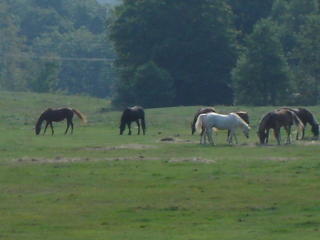
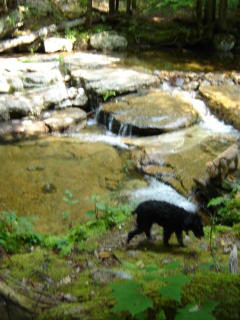

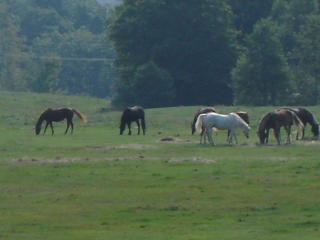 We had stayed at the same place last year. We liked its location, right in the Waterville Valley. Close to many places where we liked to climb, to hike. Not to mention its fair proximity to a number of antique shops where we could satisfy our curiosity about what would be available to us this year. The cottage was a fair size, as such little places go, with a working kitchen (full refrigerator, stove/oven), eating nook, living room, two bedrooms, three-piece bathroom. Utility was the order of the day; functionality not luxury. It would do. It was clean, and that is of utmost importance to us. We had asked last year if we might keep one of their electric brooms in the cottage so I could vacuum the rooms as required and they were agreeable; same thing this year. The proprietors are very nice people, hard-working and conscientious.
We had stayed at the same place last year. We liked its location, right in the Waterville Valley. Close to many places where we liked to climb, to hike. Not to mention its fair proximity to a number of antique shops where we could satisfy our curiosity about what would be available to us this year. The cottage was a fair size, as such little places go, with a working kitchen (full refrigerator, stove/oven), eating nook, living room, two bedrooms, three-piece bathroom. Utility was the order of the day; functionality not luxury. It would do. It was clean, and that is of utmost importance to us. We had asked last year if we might keep one of their electric brooms in the cottage so I could vacuum the rooms as required and they were agreeable; same thing this year. The proprietors are very nice people, hard-working and conscientious.
- That's all on the plus side. On the negative side was the odour that assailed our nostrils as we opened the door; mould. Same thing last year, only last year it had cleared out entirely in a few hours' time. Not so this year, the odour remained throughout our stay, impregnating all of our possessions with its noxious smell.
- There was a paved two-lane country road only a few hundred feet before the cottage, cause for worry for our little dogs' welfare. Clearly, they could not be allowed outside without us in attendance.
- On the other hand, the opposite side of the road held a pasture for what appeared to be a riding school and we enjoyed the sight of the horses rolling in the grass, frolicking, racing one another toward the barn. We liked hearing them neigh, hearing them galloping from one pasture to another.
- The bed in the cottage, while a reasonable full-size, was, alas, too small for comfort when we had to share it with our two little dogs. Small they may be, but great is their vision for their creature comfort. While we lay lengthwise on a bed, for some obscure reason, they pefer to lay widthwise, thus taking up far more of their share than might be anticipated. Besides which, any time I might be foolish enough to draw closer to Irving on the bed, thus innocently freeing up more space, they would crowd right in hard beside me, making it well-nigh impossible to then roll back in comfort, little beasts.
- We did receive fresh towels, washcloths, hand towels, dish towel on a daily basis. Um, it would have been nice, regardless, to have the benefit of larger, thirstier towels. Small cavil.
- Back again to the odour. Much could be forgiven had we not had to deal with its implacable incursions into our sensitivities. Impossible to overlook.
- The 'sofa' in the living room was a futon, and a more uncomfortable device upon which humans are meant to relieve the pressure on their spines is impossible to imagine. Incredibly uncomfortable.
None of the deficiencies would have mattered worth a damn if it had not been for the mouldy invasiveness. Too bad, so sad. Last year I emailed the proprietors, thanking them for their hospitality. I will do likewise this year, but I still haven't determined whether I should go further and inform them that they have a problem. Can they possibly be ignorant of this, in any event?
It's clear we will not be returning to this site, alas, next year. On the plus side, we have a really good alternative. It will cost us somewhat more, likely, but be well worth it.
Home again!
 We're still luxuriating in the wonder of our Queen-size bed, after fighting for room and comfort in the puny double-size bed that came with the cottage we'd rented for the week in New Hampshire. Although a double-size would have been ample for both of us, add two little dogs who feel just as entitled to stretch out in comfort as we do, and you have a recipe for disgruntlement and disentitlement. We don't begrudge them their comfort, but we do harbour some silent resentment toward these little dependents when it comes to sacrificing our own comforts to ensure theirs. Thus it is that we now revel in the large comfy landscape of our own bed in our own lovely home. So, we slept in late, deliberately and with forethought.
We're still luxuriating in the wonder of our Queen-size bed, after fighting for room and comfort in the puny double-size bed that came with the cottage we'd rented for the week in New Hampshire. Although a double-size would have been ample for both of us, add two little dogs who feel just as entitled to stretch out in comfort as we do, and you have a recipe for disgruntlement and disentitlement. We don't begrudge them their comfort, but we do harbour some silent resentment toward these little dependents when it comes to sacrificing our own comforts to ensure theirs. Thus it is that we now revel in the large comfy landscape of our own bed in our own lovely home. So, we slept in late, deliberately and with forethought.
Nothing to do but relax and luxuriate and they, our two companions, Button and Riley, didn't at all mind. After a bracing shower (our shower being large enough to host us both) we relaxed again, during breakfast which consisted of cantaloupe melon, banana, coffee/tea, cheese omelette, dark rye bread toast, cream cheese. Which post-consumption calls for a vigorous ravine walk, and so we set off to re-acquaint ourselves with our very own ravine. Mushrooms, mushrooms everywhere, in colours you might not credit: bright orange, pale blue, grey, white, mauve, pale yellow, yolk yellow. Wonders to behold; surely some of them could grace a dinner plate? We've read that puffballs of which we saw more than a mere few, are good fare, but who could take the chance? Best to enjoy them at a walking distance.
Bluejays, robins, chick-a-dees, red squirrels all welcomed us back to our home haunt. As we walk, we talk, we discuss our enjoyment of our recent week away in New Hampshire. The good points and the deficits of the cottage we had rented. Good? primarily its location directly in the Waterville Valley, providing us with easy access to many of the trails and climbs that we now feel most comfortable with. We're no longer able to ascend the larger mountains that most attracted us when we were younger with our three eager children in tow. They're all in their 40s now, with their own lives to live, leaving us where we were, together as a dynamic duo before our children were born.
We decided to drop by Canadian Tire after our walk. After we'd been stopped and chatted for a while with our friend and neighbour Mohindar, who was bemoaning the ill fate of his family members for whom danger lurked everywhere. His daughter, Luraleen, now living and working in Toronto, fell on her subway descent on the way to work and badly injured her ankle, necessitating yet another trip to Toronto to see to her welfare, despite that her mother's brother lives in the city. Mohindar's arm and hand are still in the slow and agonizing stages of recovery after his surgery in the early spring, leaving him unable to work. His son Imram has recently undergone another bout of ankle injuries due to strenuous soccer playing, yet another injury to his young body; little wonder he complains.
At Canadian Tire we looked at spring bulbs. Irving had already brought home a pack of 50 grape hyachinths for me, and I wanted to look at others, coming away on this occasion with two packs of additional tulip bulbs, and one of scilla, which I plan on putting into the ground in early October to give them the opportunity to establish a good root system before the onset of winter. They'll go, for the most part, in our more recently established garden beds. We also bought a set of dinnerware on sale, mostly because we're such suckers, especially Irving, for dinnerware. We have so many sets it's laughable, but we have the place to store them in our large kitchen and pantry, and we enjoy using different sets for different types of meals and even to reflect the varying seasons. And, truth be told, I'm rather notorious in our family for breaking dishes - fumblehanded, I guess, try as I do to be careful.
Later, both of us engaged in a little garden clean-up, assessing how the garden has changed in our week's absence. The honeydew melon growing high up on the arbour, secured by the netting Irving placed around it for safety reasons before we left, is just about ready for picking. Irving brought in a bowlful of tiny red ripe cherry tomatoes, far sweeter than any we could purchase. We'd brought enough of them with us on our trip to serve for the week we were away, in salads. We also had a half-dozen of the large yellow heritage tomatoes ready to be taken in. And the herbs had replenished themselves nicely in our absence. The hanging baskets of flowers were fine, thanks to the watering ministrations of our next-door neighbour, Susan. We brought back a really neat nutcracker for her as a gift; she collects nutcrackers.
Deciding to cut back the too-tall Caragena, both of us took tools to the job, he a pair of loppers and me a pair of secateurs, and we filled two large paper compost bags with the results. We were inspired to do this by the fact that despite that we trim the tree once or twice in the summer it's now grown beyond the size that we're comfortable with, in its front box beside the porch. They're fairly hardy, we think, and should begin to put out new growth from the tips of the major branches we've left intact, roughly five feet in height. If not, down it comes and something else will take its place.
Then the backyard required attention and we moved there with our two little dogs following. I cut back the roses, having grown rather too wild, also the length of the Mulberry, the dwarf Willow, and dead-headed flowers here and there. Then I noticed that Riley was pawing something under one of our giant tomato plants and curious, I went over to have a look. Damn, it was a little mouse, obviously in distress, and unable to preserve itself from Riley's curious ministrations. I called Irving over and he lifted the mouse carefully, in a paper napkin, looking at it closely. It looked near death, poor little thing. It had an odd green filament wrapped around one of its legs, and its tail, and with it, long strands of straw-like grass. Irving thought that the material came from nest-making, and that somehow the tiny creature had found itself imprisoned within the nest-making material and was unable to free itself. Irving cut away the offending material, but it was obviously too late to save the poor little thing. He carried it up the street to the ravine. Sad, sad.
Irving went off to pick Angelyne up from school, and soon she came bursting through the garage door to the house: "Bubbe!, Button, Riley!". Shoes off, school bag dropped on the floor,we were all treated to hearty hugs, then she surveyed the kitchen, the refrigerator. She agreed to eat a sliced peach if I were to make her a grilled cheese sandwich, with onion bread. Delicious, she said, biting delicately into the sandwich, busying herself with the creation of a desk-top namecard to satisfy the requirements of her social studies teacher who was experiencing difficulties recalling the names of the various children in her classes. What?! That someone was unable to recall the name of our adorable, very visual grandchild?
The world is indeed a strange place.
Cripes, Wasps, bloody stinging wasps!
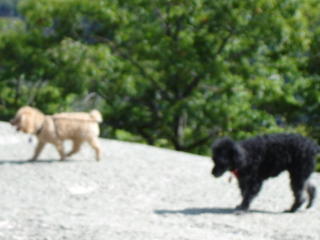
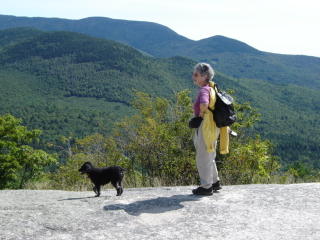 This was a first. Who would have thought, for heaven's sake. But then, why not. And the target was us. We'd just come down off the twin mountains in the Waterville Valley, the nice, easy, relatively low ones; Welsh-Dickey, congratulating ourselves for having managed the climb despite the length of time the climb took us, well over the 3-1/2 hours normally given to the climb (average). It took us, in fact, 4-1/2 hours to accomplish the double clamber, but who cares? We were also talking between ourselves about how proud we were of our two little dogs, a miniature and a toy poodle, eleven+ and six years of age respectively, that they had managed the climb more than a little successfully. If it had been hotter than it was at 20 degrees it would have been dicier for them. As it was, they were more than a little daunted at various points in the climb when they came across rockfaces much taller than they could contemplate jumping over. Riley, our toy poodle became downright frightened, even when he knew we would be lifting him to the higher plateau (having done which he regained his composure nicely). Even Button, for whom this would be at least the fourth time she would have climbed this duo, was nonplussed at the seeming hostility of the height to her small frame.
This was a first. Who would have thought, for heaven's sake. But then, why not. And the target was us. We'd just come down off the twin mountains in the Waterville Valley, the nice, easy, relatively low ones; Welsh-Dickey, congratulating ourselves for having managed the climb despite the length of time the climb took us, well over the 3-1/2 hours normally given to the climb (average). It took us, in fact, 4-1/2 hours to accomplish the double clamber, but who cares? We were also talking between ourselves about how proud we were of our two little dogs, a miniature and a toy poodle, eleven+ and six years of age respectively, that they had managed the climb more than a little successfully. If it had been hotter than it was at 20 degrees it would have been dicier for them. As it was, they were more than a little daunted at various points in the climb when they came across rockfaces much taller than they could contemplate jumping over. Riley, our toy poodle became downright frightened, even when he knew we would be lifting him to the higher plateau (having done which he regained his composure nicely). Even Button, for whom this would be at least the fourth time she would have climbed this duo, was nonplussed at the seeming hostility of the height to her small frame.
We were engaged at that point, in the descent. In its own way, nearly, but not quite as troublesome to us as the ascent. My knees were wobbly from the unaccustomed arduousness of the hours of ascending the mountains, and Irving's toes on his left foot were giving him quite a bit of pain. He was wearing hiking boots which, although not his oldest, most comfortable pair, were certainly well broken in, so we couldn't understand the source of his problem. Both of us felt that our feet had been well pounded through this day's enterprise. We were almost as slow on the descent as we had been on the ascent, just taking our time. Looking around, enjoying the greenery the scenery, the sizes and varieties of the trees, the lovely rock outcroppings; wondering where all the wildlife was. In all the years we've clambered up and down mountains in New Hampshire we've always wondered where the wildlife had gone to. Year ago, to be sure, and at the top of a mountain, we had seen a rabbit - but only once. Occasionally we'd seen red squirrels, but rarely anything more. Hell, on this occasion the wildlife was awaiting us.
A jolly family of four overtook us on the descent; at that point likely three-quarters of the way down Dickey. They had with them a nice female yellow Lab; considerably larger breed than ours. Nonetheless our toy, Riley, tried to put the large dog in its place, threatening as is his wont to beat the larger dog into submission. They passed us and a few moments later, there seemed to be a bit of a hullabaloo, and we wondered what on earth was going on. The two men and two women ran back toward us as we proceeded onward, with the yellow Lab following closely. They stopped as we came abreast and we asked if the Lab had run into a porcupine or something similar. No, they said, a swarm of wasps, and we watched as the Lab sat crookedly, trying to lick her stomach where she had been violated by the nasty biters. Her owners ran water from their flasks over her.
We obviously understood the situation rather imperfectly and announced our intention to forge on. They said they would follow, cautiously, and if we got through on the trail successfully they would continue on. It hadn't seemed sensible at that point to try bushwhacking, since the bush and the brush were fairly dense. So off we started. I was holding Riley at that juncture, and Button, our miniature poodle, was padding along innocently, just in front of Irving as they both outpaced me by about ten feet. Didn't take long before Irving began to shout and yelled at me to get off the trail. He scooped Button up, frantically waving his free arm at the same time. Once he had gained what seemed like a safe distance from the angry horde of wasps, many of which he had grasped and hurled off himself, he pulled them frantically off Button until all were gone - then he realized that they were still flocking, albeit in smaller numbers, after them and he hurried on.
For my part, I was by then well off the trail bushwhacking with Riley in my arms, trying hard not to get too tangled in the underbrush, trying to keep an eye on Irving. I could hear the others doing the same, although on the side opposite to me on the trail. When I finally rejoined Irving, we could see that he was fairly intact; he had bites on his hand and fingers, and one on his belly, but nothing else. We were worried about Button, as Irving had pulled one very pugnacious and reluctant wasp off the top of her eye, never mind the countless wasps on her body. In the end, though, because of Irving's quick response (given the circumstances it was fortunate that we had been pre-warned) no real damage had been done to her. Despite which, once we continued our descent leaving the wasps behind us, Button went along at a pace we couldn't match, in her anxiety to put as much space between the dreaded, hated stinging insects as possible. Poor Button; this wasn't the only run-in she's experienced in her years with stinging insects, only the latest. She hates stinging insects with an abiding passion, and little wonder.
What a way to end a great climb, an effort-filled clamber to attain great views. What a meagre reward for a brave little dog after putting out such an excess of energy to please her human companions. What a little champion, two little champions. Another memorable day, in a lifetime of days to be remembered.
Life's Little Trials
 Poor little tyke. The day started off normally enough. He gave a hacking kind of cough early in the morning, enough to send Button scurrying, worrying off. She fears any kind of sound or movement out of the ordinary emanating from her smaller companion, and makes herself scarce at those times. So he coughed, as though he was trying to clear away an obstruction of some kind in his throat. It happens, and often; nothing out of the ordinary. He ate his morning meal, I observed him drinking water. He behaved as he normally does when we set out on our morning ravine walk, and all seemed well.
Poor little tyke. The day started off normally enough. He gave a hacking kind of cough early in the morning, enough to send Button scurrying, worrying off. She fears any kind of sound or movement out of the ordinary emanating from her smaller companion, and makes herself scarce at those times. So he coughed, as though he was trying to clear away an obstruction of some kind in his throat. It happens, and often; nothing out of the ordinary. He ate his morning meal, I observed him drinking water. He behaved as he normally does when we set out on our morning ravine walk, and all seemed well.
Throughout the course of the day that same cough repeated itself occasionally, but not that frequently that it might raise any alarm bells. He ate his dinner just as a good little dog should. Later, in the evening, just after nine, I went out to the backyard with him. We permit Button, our miniature poodle, our independent, sensible little dog to venture out on her own after dark. But not him, he's too aggressive, and if he thinks there's an animal in 'his' backyard, on 'his' territory, he reacts. Too much testosterone in a very small body, I expect. We go out with him when it's dark to ensure that the raccoon, if its at the compost, which it often is, will clamber over the fence and Riley won't challenge it.
This time, soon as I opened the sliding door, off he charged, down the stairs of the deck lickety-split. All that barking and charging about set off a really serious round of coughing and hacking. I watched his little body being wracked by the coughing. And when that stopped and I expected him to return to sanity, I froze instead with disbelief as a long shrieking ululation of pain emitted from his tiny throat. I'd never heard anything like it, could hardly believe that anything that loud come come from that little body. My husband rushed out of the house, wanting to know what had happened. Then, a repeat of the shriek and hearing it instilled an instant fear in us.
We bundled ourselves together, including Button, got into the car and drove directly downtown to the 24-hour emergency veterinarian hospital. Irving cursed the city bus leisurely blocking the road before we even got onto the highway. And where does all that traffic on the Queensway come from, for heaven's sake, at this time of night. An accident? No wonder there's a back-up of vehicles, don't people know how to drive defensively, intelligently? Summer's on the wane, people have forgotten, perhaps how to drive sensibly in the dark. Finally, we're there, exit the car and wait until the receptionist opens the door for us, after ascertaining the legitimacy of our arrival (we had telephoned beforehand; they insist on that).
We are entered on their computer system, we've been there before. Other previous nasty occurrences out of normal hours of operation. We're asked to pay the obligatory fee for the use of their emergency service up front: $106 in cash, as requested. Anything incurred in services or pharmaceuticals will be added to that, as we well know. And who cares? the feeling of helplessness in the face of the tiny dog's distress must be assuaged; we've got to know what's wrong, and we desperately want the veterinarian on duty to make him well again. But the duty vet is busy, and we wait. She's performing an emergency procedure on yet another hapless pet, whose owners have been given a private room to sit out their anguish, given the seriousness of the situation.
We're there more than an hour, and finally the vet is free to see him. An assistant veterinarian had earlier come along to see Riley in the waiting room to ascertain whether he could safely await examination and treatment. By then he was sitting quietly and apparently without distress, on my lap, and he was deemed to be in no immediate danger. The veterinarian, when she appears in the little examination room where we've been re-located, introduces herself and apologizes for the delay. She asks if June 14 is really Riley's birthday, as it is hers too. We recognize her as being the same vet who had expressed Riley's painfully swollen anal glands a year earlier. She listens to his heartbeat, smiles and says he has the beat of an athlete. His lungs, his eyes, his legs, his ears, and down into his mouth. He's an obliging little guy under these circumstances and allows himself to be prodded and pinched. And pinch him she does, under his throat, enough to bring forth a yelp of pain, she says, but he is stoic and no sound is emitted from that little throat now, no coughing, nothing appears amiss.
We talk about what it could conceivably be. A sore throat, perhaps, and that would explain his pain, particularly if the little beast is a complainer, and he is, often. He might have scratched the inside of his throat with something, a chewy, anything like that. We've already ruled out chewing wood, which many dogs do, and get splinters in their throats for their obsession. He isn't a destroyer of toys or furniture, so that's out. No point taking an X-ray she tells us, it would only divulge metal or wood. His condition, given his willingness to co-operate and his stoical performance, his lack of untoward symptoms at this point, doesn't warrant a hospital stay. We breathe an audible sigh of relief.
Keep an eye on him, she says. If the shrieking re-occurs and we're really worried about it, bring him back. Meanwhile, he's having no trouble breathing, there's no indication of any kind of obstruction. It's her considered opinion that in a day or two whatever scratched his throat or caused him to have a sore throat will have been resolved. We're feeling much more relaxed, and thank her effusively. We say our goodbyes, to her, to the receptionist, the assistant, and to the quite young couple who turned up with their family cat in a carrier, and their seven-month-old little boy in another. No sight of the two young men who arrived earlier in the evening with a tiny white rat, limp.
We return home drained, exhausted, but relieved, so very relieved.
I Wonder Why
 Well of course I wonder about all manner of things. Why, for example, when we have the potential to be so much more than we are, we turn out to be just the way we are. Why is that? Why, when we owe so much to those who have gone before and paved the way for us, do we forget what we owe those pioneers? Why don't we use our brains to their full, or even partial potential? Why do we so often view strangers as...strange? Why do we have a public persona and a private one? Does this mean that we are ashamed of who we truly are, or does it possibly mean we want to keep ourselves to ourselves, protect our privacy.
Well of course I wonder about all manner of things. Why, for example, when we have the potential to be so much more than we are, we turn out to be just the way we are. Why is that? Why, when we owe so much to those who have gone before and paved the way for us, do we forget what we owe those pioneers? Why don't we use our brains to their full, or even partial potential? Why do we so often view strangers as...strange? Why do we have a public persona and a private one? Does this mean that we are ashamed of who we truly are, or does it possibly mean we want to keep ourselves to ourselves, protect our privacy.
On this particular occasion my whys belong to none of the above. I wonder why someone like me feels restrained in certain ways. I can understand restraint when being with strangers, although truth to tell, so many of us, myself including behave in a rather unrestrained manner with strangers. And why is that? Do we feel that because they are strangers whatever we say will not come back to haunt us? Is that it?
All right, let's cut to the chase. My oldest son, now 45 years old, has a habit of speaking very softly. When I speak on the telephone with him I have to concentrate, focus my attention, lest I miss something. But no matter how hard I try to listen to his every word I invariably let something important drift by me. Actually, I don't 'let' anything drift by, it's that his voice carries through the line in a most inadquate way, so that I cannot hear distinctly, quite often, just what he is saying. So why, for heaven's sake, don't I ask him to speak louder, more distinctly, for me. I believe I know why. I fear hurting his feelings. Silly as it is, that's what I think. The end result is that he will tell me something and I will respond with queries or conclusions totally inappropriate to what he has told me. When he responds to that his voice has an edge to it, a slight annoyance. Such as to say what's the matter with her anyway, can't she hear what I'm saying, doesn't she understand my meaning? Well, no - to both. And I think of my conversations with my mother, my impatience with her, with her responses to things I said in the past. I concluded, all too often, that too many things were beyond her understanding, that she was simple. Mea culpa.
Hey, not really. She was simple. And simply frustrating. Is this what happens to people when they become old and older? I'm getting there. Is it really legitimate to compare my experience with my mother to that with my oldest son and our difficulty in communicating over the telephone? No such difficulty that I know of occurs when we speak face to face. Which, admittedly, isn't that often given that we live in different cities.
I consider myself to be a fairly intelligent person, fairly well read, and fully engaged with the world and everything that occurs within it. I'd like to believe he feels likewise about me. What if he really feels the way I did about my mother? Egad. Truth is, my mother wasn't dreadfully intelligent. Not stupid by any means, but obtuse and stubborn; her education was notoriously lacking. Not that one cannot acquire a good life's-experience kind of education, but I don't feel she ever did. She had a dull mind, and that's that.
Moving on. When I speak with my granddaughter, a nine-year-old child who is quite intelligent, enjoys an excellent vocabulary for her age, and is pleasingly articulate, I have the same kind of problem. Not face to face. But over the telephone. When she's communicating something to me over the telephone I can barely make out her words at times. Now, with her I do ask that she repeat what she's said. And guess what? Makes little difference. There was a time when she tended to slur her words in keeping with the lingua franca of small children, but she really doesn't any more. I try to respond to what I think she has said to me and guess what? Way off key. Then she indicates a slight impatience with me, and insists I didn't understand, repeating what she had really said. And the light comes on.
I don't think I'm becoming heard of hearing. It's possible, I imagine, at age 68 to experience a diminishment of aural ability. But in my case I don't think that's what's happened. Truth to tell, I believe I've always had a bit of a disconnect in aural communication. In fact I know I have. And the funny thing is, when that has happened, and I realize it has happened off and on for as long as I can recall, even back to when I was a young girl, I felt ashamed, somehow responsible, inadequate to the situation at hand. I would always hesitate to ask someone to repeat their statement or question, and try to overcome the difficulty as best I could.
Odd, isn't it? It's the manner or behaviour of someone who is self-contained and also suffers from low self esteem. But I don't consider myself to be a shy person or someone who suffers from low self esteem. I am, rather, a fairly self-assured person. I take pride in my level of understanding of people and situations, the information I have been able to assimilate and broaden my realization of the world and its denizens; I am a fairly well informed person.
Just the way it is. Is it? Is it pride then that stops me from admitting I need more information, that I haven't understood something? No, it's not that I haven't understood what I have heard, it is that I haven't heard, so understanding could not be forthcoming. It is pride, nonetheless, the fear of being thought to be slow, stupid, uncomprehending that keeps me from requesting a repeat statement, elucidation. Is there any reasonable cure for this? Ah, do I truly care?
The Wealthiest Nation on Earth
 News continues to reveal the crass stupidity of mankind. In this most recent edition of idiocy we see a State, Louisiana, and a country, the United States, unable to function in the most civilized of ways in aid of a disaster-stricken population.
News continues to reveal the crass stupidity of mankind. In this most recent edition of idiocy we see a State, Louisiana, and a country, the United States, unable to function in the most civilized of ways in aid of a disaster-stricken population.
Correct me if I'm wrong: isn't it only third-world, poverty-stricken countries for whom natural disasters become truly disastrous, and then conscious-stricken wealthy countries attempt to make amends by rushing to the rescue? To its vast credit, the United States has always been first and foremost among the rescuing countries, doing its utmost to more than pull its weight in bringing relief to the poor, to ameliorate the suffering of countless millions in emerging economies.
Well, what happened? Earth and weather scientists both within the United States and without have known for an awfully long time that a disaster like the aftermath of Hurricane Katrina would pose the most real danger of catastrophe for the city of New Orleans. As the saying goes, it was only a matter of time: not if, but when. Piddly little sandbag dikes worthy of almost-futile attempts by have-not countries were thought to suffice for the time being.
The solution found for the city whose tenuous existence has been celebrated for its tenacity, its very physical existence where swamp should be, and for its celebrated joy in life, its music, its night life, its focus on the arts was pitiful, but accepted. The question is write large: why? Why would a clearly inadequate system of dikes and levees be acceptable when a far more effective solution was possible, albeit infinitely more costly? Don't we believe, universally, that human life is more precious than mere lucre? The funds were not made available, simple as that. Funding agencies at the federal and state level obviously had far more important enterprises to look after. No money to be made in saving lives?
How is it that the Netherlands could do it? In that country fifty percent of the population lives below sea level. There has been a long and fabled history of the bravery of its people in the face of the tenuousness of their daily lives. They've kept their proverbial finger in the dike and have survived. Decades ago, after a costly disaster where thousands of lives were lost as a result of the incoming seas following a storm, that country brought in a massive system of hydraulic sea walls. Costly yes, but it worked, it works. The Dutch have peace of mind.
Any thinking people living in New Orleans must have been aware that it was only a matter of time. Short-term memories and expedience have cost thousands their lives in the immediate aftermath of the storm. What's worse, and is even more mind-boggling is the utter inefficiency of the country's emergency relief system. It is there in name, perhaps in spirit, but it is most obviously now absent in reality. Survivors who were plucked from the rooftops have been left by their rescuers in that water-besieged city to find their own way on foot out of the dilemma. Good luck. It's not that the rescuers are hard-hearted and don't care, it's that they are too few, and remain determined to continue their efforts to rescue other stranded survivors.
Time is running out, and quickly. Stranded and desperate people in the city of New Orleans are frantically searching for food, for potable water surrounded by a sea of muck and filth. These are elements of the population who hadn't the wherewithal; funds, vehicles, to spirit themselves and their loved ones out of the Hurricane's destructive path. They would wait things out and hope for the best. Trouble was, the best never did show itself, the worst certainly did. And continues to, in the form of looters and hoodlums threatening survivors and rescuers alike.
Where is the army? Where are military helicopters and troop carriers to airlift these desperate people, not all that far from starvation and dreadful germ- and bacteria-borne illnesses to safety? Where are the hospital-medical ships which could offer help to the beleaguered health care workers in the inoperative hospitals? Where are all the civil defence agencies whose job now should be to secure life and limb of a helpless population? Are they expendable because they're mostly black, mostly poor?
Where is the conscience of the rest of America? Are people elsewhere clamouring for more effective, more immediate action from their government, no matter the cost? Where is the world whom the U.S. has always aided, without question, under like situations?
What will be the final upshot of this situation in the U.S.? Will the American electorate finally realize what it is that they have elected to lead them? Will they demand a more accountable and equitable solution to their national problems? Will this be the death knell for George W. Bush's 'legacy'? If not, why not?






















